The Best Free & Affordable Roadmap Tools for SaaS Companies

By Dayana Mayfield
Last updated on Wed Jun 11 2025
Do you want all the benefits of using a SaaS roadmap tool but without paying a hefty subscription fee? If so, you're in the right place. We’ve put together a review of freemium and affordable roadmap tools that offer all the features SaaS (software as a service) companies like yours need to succeed.
In 2025, worldwide spending on SaaS products reached $299 billion USD, and 86% of companies now expect at least 80% of their software needs to be met by SaaS tools. That means more competition—and more pressure to build and communicate your product vision effectively. Many SaaS teams are also adopting AI, supported by Datasets for Machine Learning to build smarter workflows and features.
Before delving into these products, let’s take a closer look at why your SaaS company needs roadmap tools and how to pick the right one for your team.
Why all SaaS companies need a public roadmap tool
Basic roadmapping software provides a visual guide of the development progress of a product. Members of the development team use the roadmap to stay updated as the product passes through each development stage. The roadmap also ensures that the product’s developers do not deviate from established plans and goals.
The best roadmap tools update not just the product development team but also interested public stakeholders. It may seem counterintuitive to make your roadmap public, especially in the highly competitive SaaS industry, but we promise it’s worth it.
Below are some reasons why:
Proof of innovation
The motto of today’s world is, innovate or die. Use a public roadmap to show your customers that you are constantly innovating and creating new ways to satisfy their needs. It increases customer engagement, and according to Gallup, B2B companies with high levels of customer engagement have 63% lower customer attrition rate.
Gather customer feedback
If you don’t listen to customer feedback while creating a product, you might end up with a finished product that fails to resonate with your target audience. Avoid such issues by carrying your customers along during each step of the product development stage. Do this with a public roadmap and use the customer feedback to tailor products to deliver better customer satisfaction.
According to Yonyx, other benefits of regularly communicating with customers are understanding them better and displaying your commitment to making them happy. When customers notice your effort, they feel more valued, leading to higher customer retention.
Collaborate with stakeholders
A public roadmap tool facilitates working with stakeholders from all over the world. As long as they have internet access, team members, consumers, investors, and other interested parties can check product development updates. Besides checking for updates, stakeholders can make contributions that add value to the product development process.
Communicate with customers
Use the public roadmap to keep active and prospective customers updated about upcoming features. If existing customers know that new and better product features are coming, it keeps them engaged throughout the product’s lifecycle and reduces customer churn. It can also generate leads and win over potential customers by showing them that future features will make the product worth their while.
Build trust through greater transparency
Your public roadmap can generate social media buzz among your target market. The more customers are talking about you, the more brand awareness you generate.
Also, having a public roadmap creates transparency. According to Sprout Social, 85% of consumers are more likely to give a business a second chance after a bad experience if the brand has a history of transparency. Since every brand experiences a crisis at some point, it helps to win the loyalty of your customers today by being transparent.
Here’s an example roadmap built with Frill:

You can use Frill to gather ideas from users, share your roadmap, and make announcements about new releases.
Let’s look at some important features of product roadmapping software.
What features to look for in a roadmap tool
You can draw a roadmap of your company’s plans on a whiteboard and share it with your team, but that’s not efficient. A better option is a tool that your team and other stakeholders can view and collaborate on from anywhere in the world, 24/7. That’s why web-based roadmap tools are the preferred option.
Most roadmaps for SaaS companies are timeline or time horizon roadmaps. Timeline roadmaps show ideas and planned activities for the coming months. At Frill, we use a time horizon roadmap, which splits projects into plans, under-development projects, and completed tasks.
Time horizon roadmaps may be more comprehensive and easier to follow, but you can opt for a timeline roadmap if it better fits your needs. However, before picking a time horizon or timeline roadmap, verify that they have the following features.
Public roadmap
Private roadmaps are only accessible by developer teams and other authorized parties, while a public roadmap is accessible by all. We’ve established that public roadmaps can benefit you and your customers immensely by keeping your customers updated about upcoming products and features.
Keeping your customers updated shows that you value their attention and opinion. It also proves to customers that you are willing to go the extra mile to retain their patronage.
Feedback portal for users
It’s not enough that your users can see your roadmap. They should also be able to interact with it and provide feedback about how they feel about your product plans. To achieve this, you need a roadmap that features a user-friendly feedback portal.
You can also use the feedback portal to collect insights about how to improve the customer experience of your users. According to PWC, even when consumers love a product, 59% will dump that product after several bad experiences.
Update announcements
Choose a public roadmap that allows you to share announcements about the latest product features and updates.
According to GrooveHQ, announcements can build tremendous loyalty and retention among customers. Announcements ashow customers that you are transparent and constantly working to improve product quality.
Search function
Product updates and customer feedback can run into the hundreds on a public roadmap. Simplify entry navigation by choosing a roadmap with a search function. The Frill search bar allows you to find specific entries within seconds by simply entering a keyword and hitting enter.
Amazing UX and single sign-on for users
Your roadmap should show users that you’re building what they really want. But how can you build what users want if you don’t have their feedback?
Not only should your roadmap tool have a feedback portal and public roadmap, but it should also have killer UX.
The UX of your roadmap will speak volumes about your brand. If you’re using something old and ugly, users might think you built that.
But we all know that UX isn’t just about looks. Great UX means that users are more likely to interact with your roadmap. They’ll be more likely to leave you feedback, check out your roadmap, and comment on what you’re building if they enjoy the user experience.
You should also make sure the tool you use has SSO available, so users don’t need a separate login just to engage with your roadmap.
Top free & affordable roadmapping tools
We have examined how a SaaS roadmapping tool can benefit your company and the features of a good roadmap software. Let’s now look at your best budget-friendly options.
1. Frill
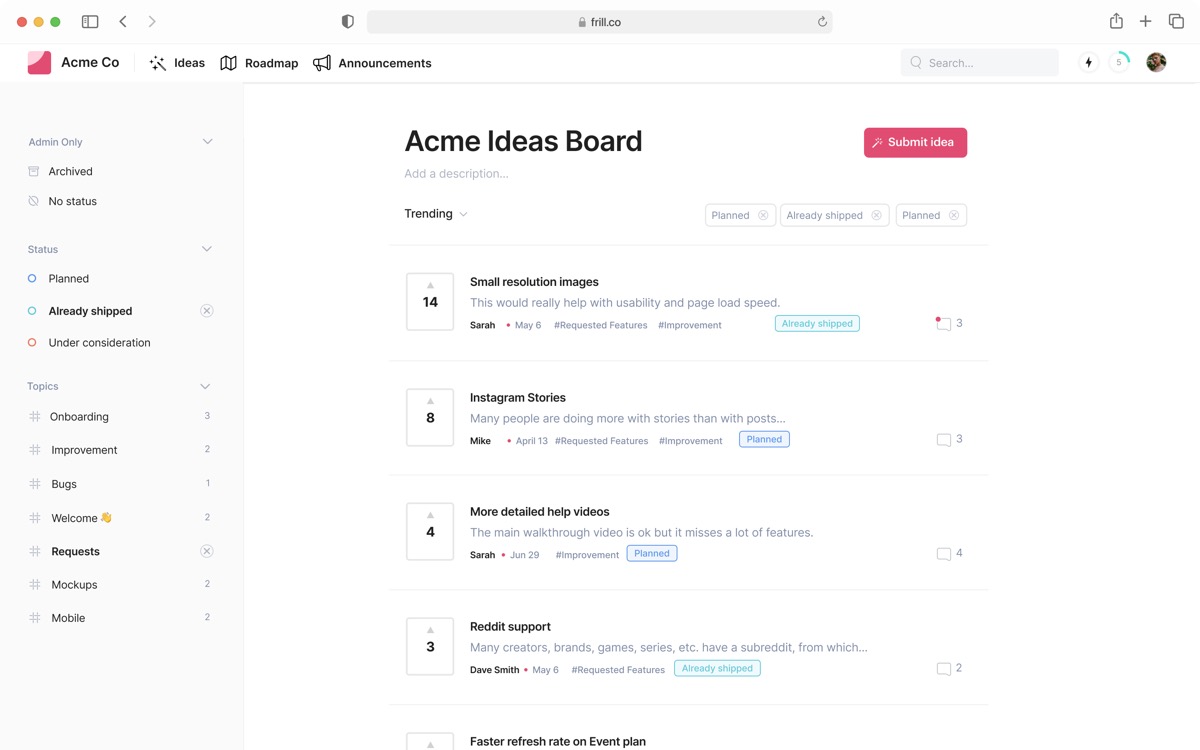
Frill is a simple-to-use roadmapping tool that SaaS companies use for engaging and enlightening their users about upcoming product features. It’s known for having great UX compared to most other roadmap and feedback platforms.
The tool’s user-friendly interface simplifies leaving feature suggestions and consumer feedback. If you take action regarding a user’s contribution, the contributor will receive a notification.
Contributors can also upvote ideas or feedback from other users, so you know which suggestions to prioritize.
Features:
Share a public roadmap to keep users informed and engaged
Let users vote on ideas to highlight the most valuable suggestions
Announce new features with an in-app widget for maximum visibility
Use single sign-on (SSO) for a seamless user experience
Automatically notify users when their ideas get updated or shipped
Pricing:
Frill has low-cost plans that cost a fraction of enterprise user feedback tools. Pay $25 per month for the Startup plan and get access to our core features, Ideas, Roadmaps & Announcements. Choose the Business Plan for $49 per month to unlock unlimited ideas.
2. FeatureOS
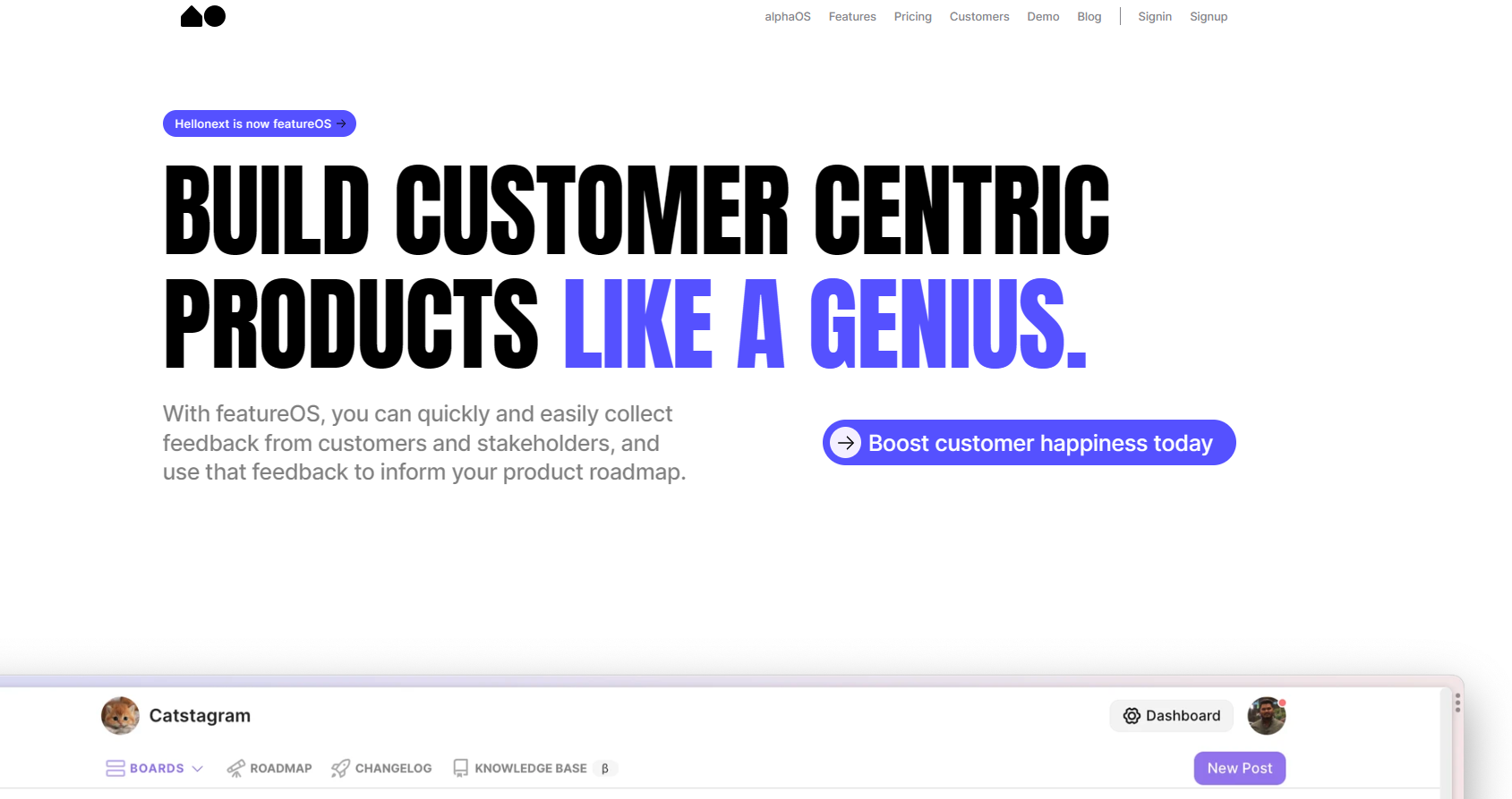
FeatureOS offers intuitive platform for collecting and organizing customer feature requests. As part of the FeatureOS suite, it supports both public and private feedback boards, changelogs, and roadmaps—all seamlessly integrated into one workspace. With built-in collaboration tools and integrations like Slack, teams can act on user feedback faster and more efficiently than ever.
Features:
Centralize user feedback with customizable public or private boards
Visualize your product strategy with drag-and-drop roadmaps
Announce updates clearly with integrated changelogs and widgets
Empower support with a searchable knowledge base and ticket deflectors
Automate workflows and surface insights faster with built-in AI tools
Pricing:
FeatureOS has three flexible plans. Starter is $60/month for indie teams, including 5 boards and 5 seats. Growth at $120/month adds more boards, API access, and whitelabeling. Business, at $250/month, unlocks unlimited boards and integrations, Salesforce access, live chat, and dev hours. All plans include AI tools, moderation, and full feature access.
3. Nolt

Nolt is another convenient roadmap software that works with the tools most SaaS companies use, like Trello and Slack. You can make the feedback board private or public, and you can ban problematic users.
Users can upvote ideas shared on the roadmap, and you can prioritize the most upvoted ideas for action. To make sure you don’t miss anything, Nolt sends weekly email reports regarding activity on your feedback board. Users can also receive email updates about their contributions.
Features:
Pricing:
You can have more than one feedback board on Nolt, but the platform charges $25 per board. Each board can have an unlimited number of users and posts.
4. Noora
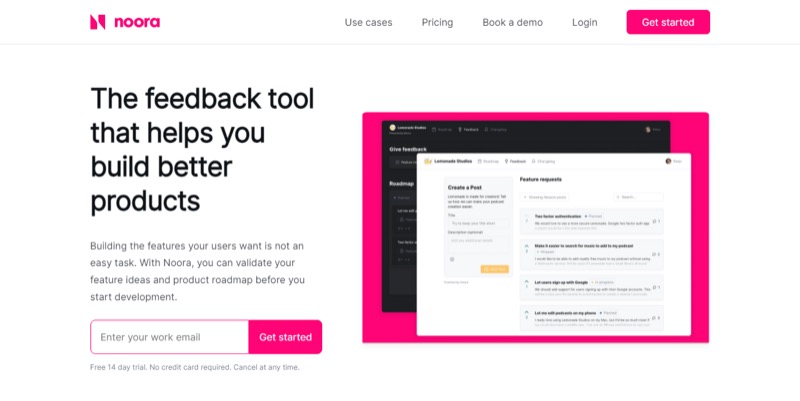
Many SaaS companies use Noora to show users what they are working on and gather customer feedback about their upcoming products. The intuitive tool simplifies building and updating public roadmaps by automatically creating roadmaps with data collected from your posts.
You can customize public roadmaps with your brand colors, and Noora provides users with automatic roadmap updates via email.
Features:
Create public or private boards to collect user feedback in one place
Let users vote, comment, and suggest new ideas for faster prioritization
Embed seamlessly into your app or site with simple integrations
Enable SSO to reduce friction and improve response rates
Export data to CSV and sync with internal workflows effortlessly
Pricing:
The lowest-priced Noora plan costs $29 a month, and it provides unlimited public boards and Slack integration. The $69 Pro package offers more features, including the option for private boards. You also have the option to customize a package to contain only the features you want. The price of the custom package depends on the features you add.
5. Airfocus
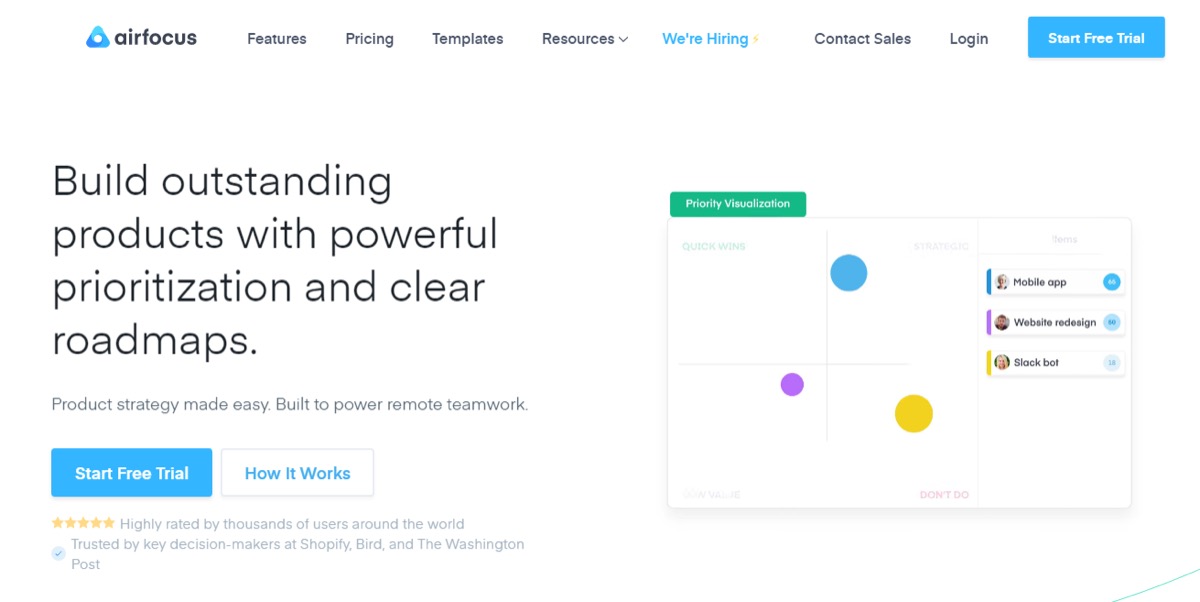
Airfocus simplifies building a product strategy and executing it with team members spread all over the globe. Depending on your preferences, you can create either a timeline roadmap or a Kanban roadmap. Both have a drag-and-drop interface that makes it super easy to modify or update roadmaps.
You can engage in real-time discussions with users that share ideas or updates. When sharing roadmaps with these users, you can modify the settings to ensure that only authorized people can see sensitive information. Airfocus doesn’t have a feedback portal yet, but one is coming soon.
Features:
Build customizable, shareable roadmaps tailored to any audience
Manage portfolios with visibility across teams, products, and OKRs
Collect customer feedback and turn insights into strategy
Prioritize work with flexible scoring systems and collaborative tools
Plan team capacity and align delivery with strategic objectives
Pricing:
Airfocus offers three pricing tiers designed for different team sizes and needs. The Core plan starts at $59 per editor/month (billed annually) and includes essentials like roadmaps, prioritization, and integrations. The Scale plan, for teams with at least 5 editors, adds hierarchies, advanced views, and portfolio tools—pricing is available upon request. Enterprise includes OKRs, capacity planning, SAML SSO, and custom onboarding, also with custom pricing. All plans allow unlimited contributors.
6. ProductBoard
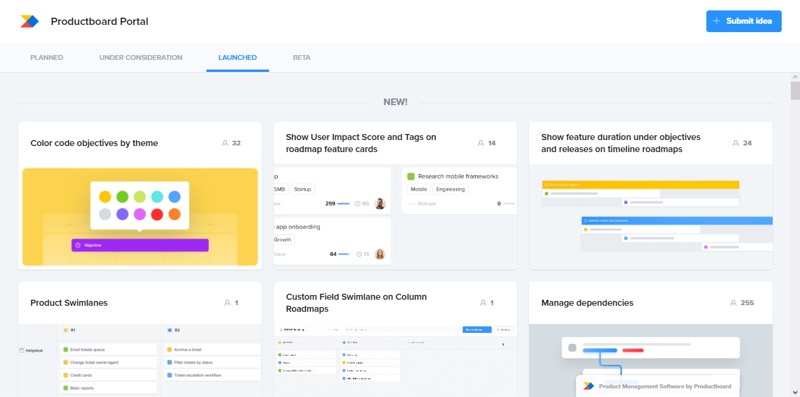
ProductBoard bridges the gap between a product team’s ideas and what the target users want. It accomplishes this with a public roadmap platform for sharing product plans and gathering customer feedback.
You can also use the customer feedback tool to source new ideas about how to improve your product. For optimal engagement, you can tailor your product roadmap to be aesthetically pleasing and constantly updated.
Features:
Centralize customer feedback to uncover patterns and prioritize the right features
Create and share dynamic, real-time roadmaps across teams and stakeholders
Use AI-powered insights with Productboard Pulse to accelerate decision-making
Align product development with company objectives and customer needs
Track feature progress, health, and dependencies to ensure timely delivery
Pricing:
Productboard offers four pricing tiers. The Starter plan is free and includes 50 feedback notes and one product portal. Essentials starts at $19/maker/month (billed annually) and expands feedback capacity and planning tools. Pro, at $59/maker/month, adds automation and customization. Enterprise includes advanced security, OKRs, and integrations, with custom pricing. Unlimited contributors and viewers are included on all plans.
7. Upvoty
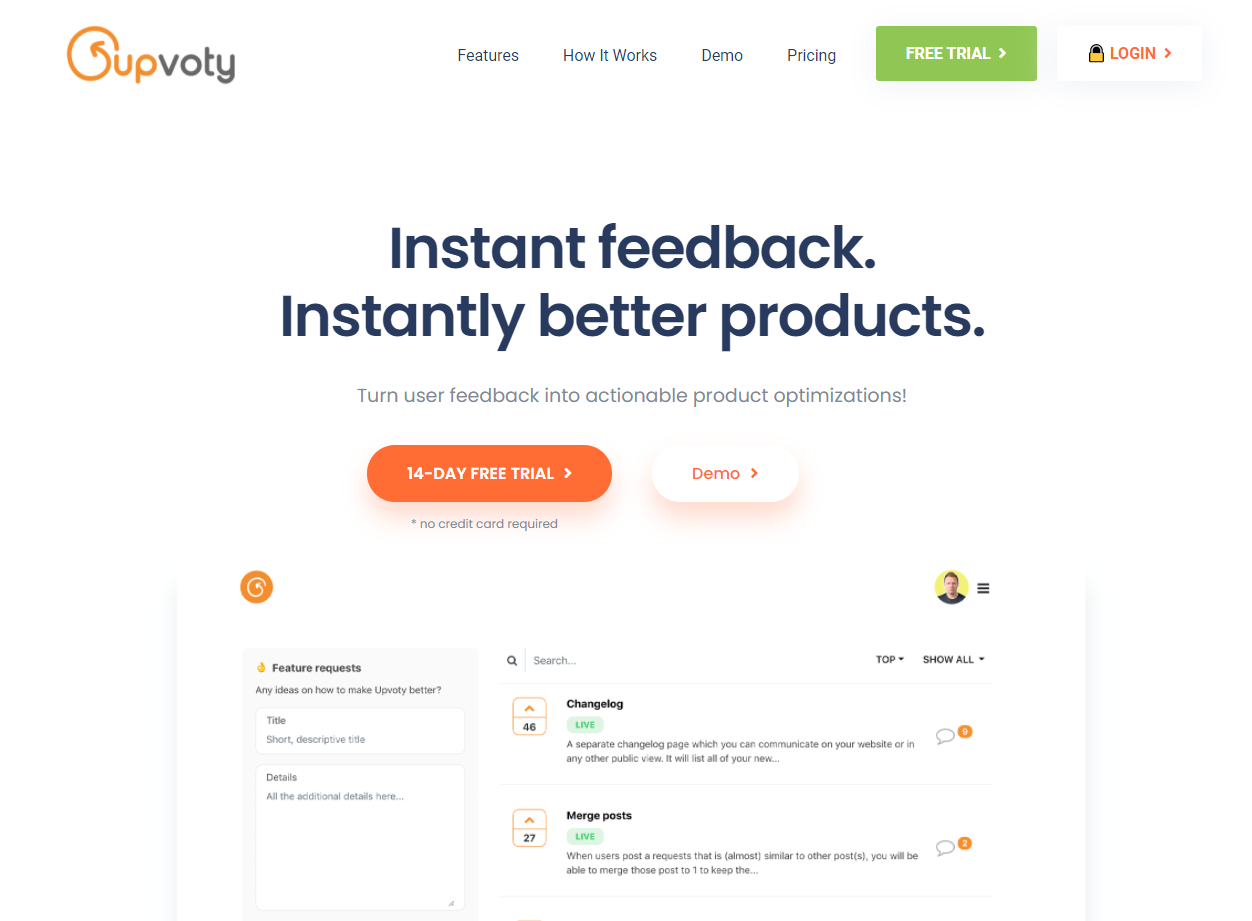
You can integrate Upvoty with Chrome, Mozilla, Zapier, Slack, Intercom, and other platforms to gather and manage user feedback from various sources. Upvoty also provides the option to share your roadmap publicly or internally.
Users can vote on ideas shared on public roadmaps, so you know which ideas to act on or ignore. Upvoty also has a Changelog feature for communicating new updates and releases. Users receive automatic notifications about each update release, making it easy to carry along stakeholders throughout a product’s lifecycle.
Features:
Collect and prioritize feature requests through customizable feedback boards
Share visual product roadmaps and keep users informed with real-time updates
Publish changelogs to announce releases and close the feedback loop
Enable seamless team collaboration with post assignment, tags, and moderation
Customize everything from domains to themes, with SSO, widgets, and AI duplicate detection
Pricing:
Upvoty offers three straightforward plans starting at $15/month. The Power plan includes unlimited boards, users, and a roadmap for one project. Super, at $49/month, adds integrations like Slack and Intercom. Hyper, at $99/month, supports three projects, custom SSO, and full customization. All plans include unlimited team members, a custom domain, and a 14-day free trial with no credit card required.
8. Canny

Launch a public product roadmap on Canny to keep everyone in the loop. The map comes with notifications that automatically update users about new features and drives customer engagement. It’s also great for collaborating with teammates in various locations and departments.
Its simple roadmap design simplifies collecting feedback from consumers and showing stakeholders your latest SaaS innovations.
Features:
Collect feedback from users and teammates in one organized, branded space
Segment and filter feedback by customer type, tags, or revenue impact
Prioritize feature ideas with scoring and build shareable public or private roadmaps
Announce product updates with a customizable changelog and embeddable widget
Automatically tie feedback to user accounts and track status with email updates
Pricing:
Canny offers four pricing tiers. The Free plan includes up to 25 tracked users and unlimited posts. Core starts at $19/month (billed yearly) with support for over 100 users, custom domains, and translations. Pro, at $79/month, adds integrations and privacy controls. Business includes SSO and CRM support, with pricing available on request.
9. ProductPlan
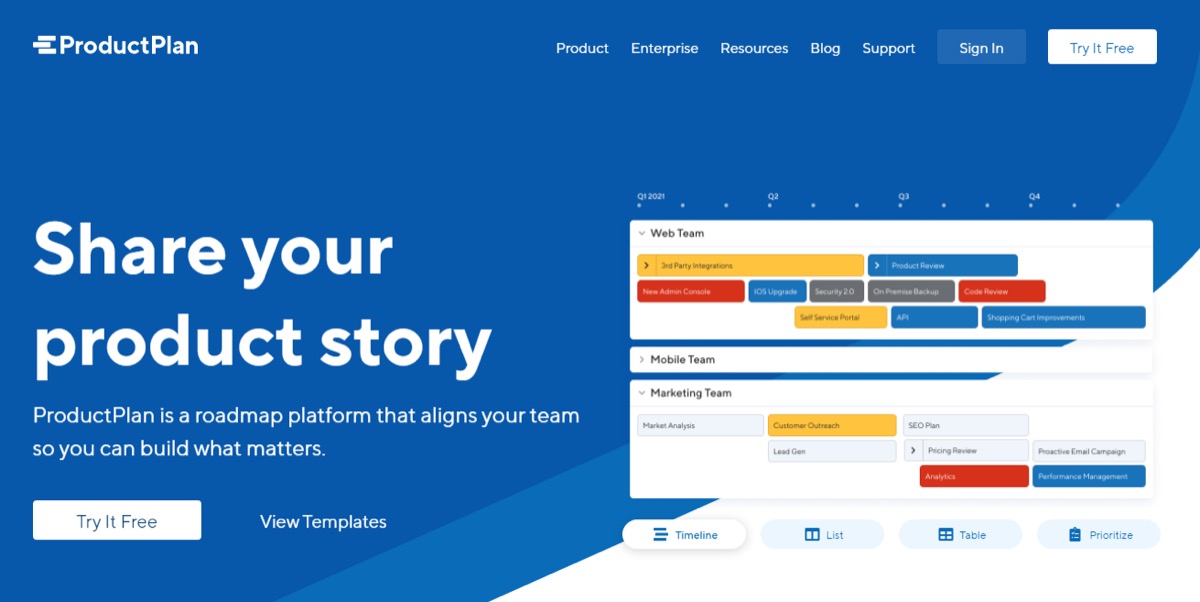
ProductPlan is an advanced roadmapping tool for ensuring every team member is on the same page regarding product development strategies and objectives. Its visual roadmap is easy to follow and understand, and regardless of the package you purchase, you can have unlimited viewers. Each viewer can provide valuable feedback regarding how best to progress with your product development.
That said, unlike other roadmapping tools on our list, ProductPlan doesn’t provide a public roadmap option. Instead, you can create unlimited roadmaps and share them with specific stakeholders via secure links. Doing so eliminates issues like competitors spying on your roadmap.
Features:
Build strategic product roadmaps with drag-and-drop clarity and multiple view options
Align initiatives to business objectives with OKR-linked roadmapping and progress tracking
Capture and prioritize ideas from teams and stakeholders using customizable forms
Plan launches with checklists and dashboards that keep delivery on track
Integrate with popular tools to sync strategy, execution, and feedback workflows
Pricing:
ProductPlan offers custom pricing tailored to your team’s goals, workflows, and integration needs. There are no fixed tiers, as pricing is determined through a consultation that considers your roadmap use cases, support level, and feature requirements to deliver a scalable, personalized solution.
10. Roadmunk
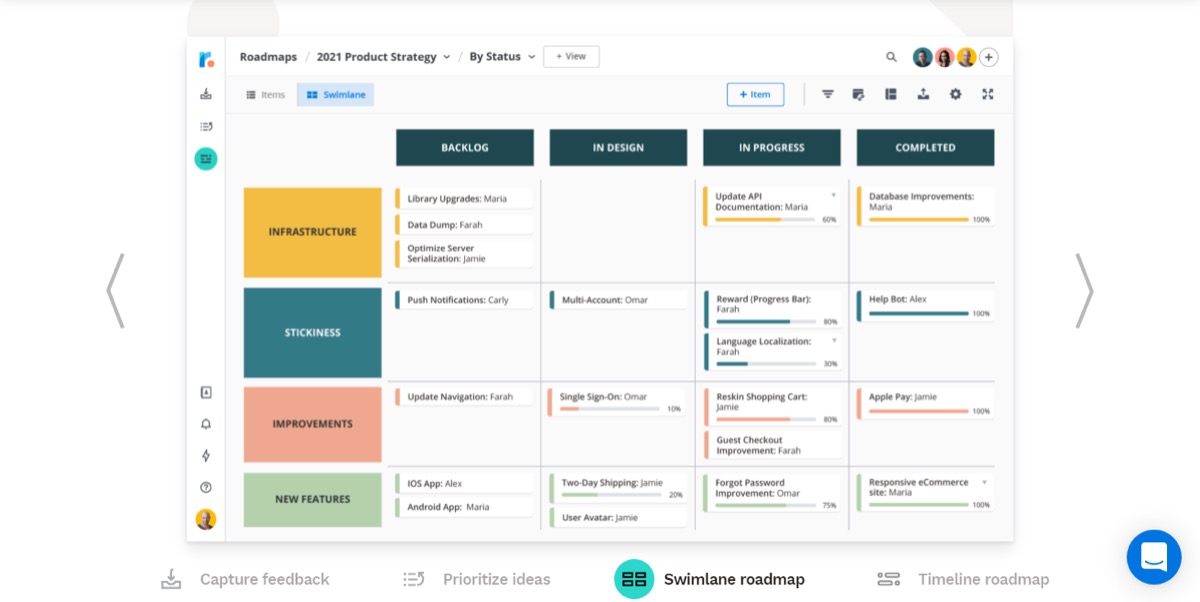
Roadmunk provides you with several templates for creating a useful and visually stunning product map. It features a drag-and-drop editor for modifying templates to suit your needs and collaborating seamlessly with teammates.
Choose between a swimlane and timeline roadmap style and capture feedback from customers. You can also manage and filter feedback to ensure that you see the most important ones first.
Features:
Capture customer feedback in a centralized inbox and portals for each product area
Prioritize ideas with built-in frameworks like RICE or value vs. effort scoring
Build strategic roadmaps using timeline or swimlane views
Create multiple customized views from a single dataset and export to URL, PNG, or HTML
Integrate seamlessly with Jira, Azure DevOps, and other tools using built-in or custom APIs
Pricing:
If you are an individual or new company, the $19 per month plan is adequate. You get unlimited roadmaps, feedback submission via a Chrome extension, and feedback management tools. Go for the $49 per month package if you want custom roadmap color palettes and up to five reviewers to have access to your account. There’s also the $99 plan for companies that need advanced security and support.
11. Trello
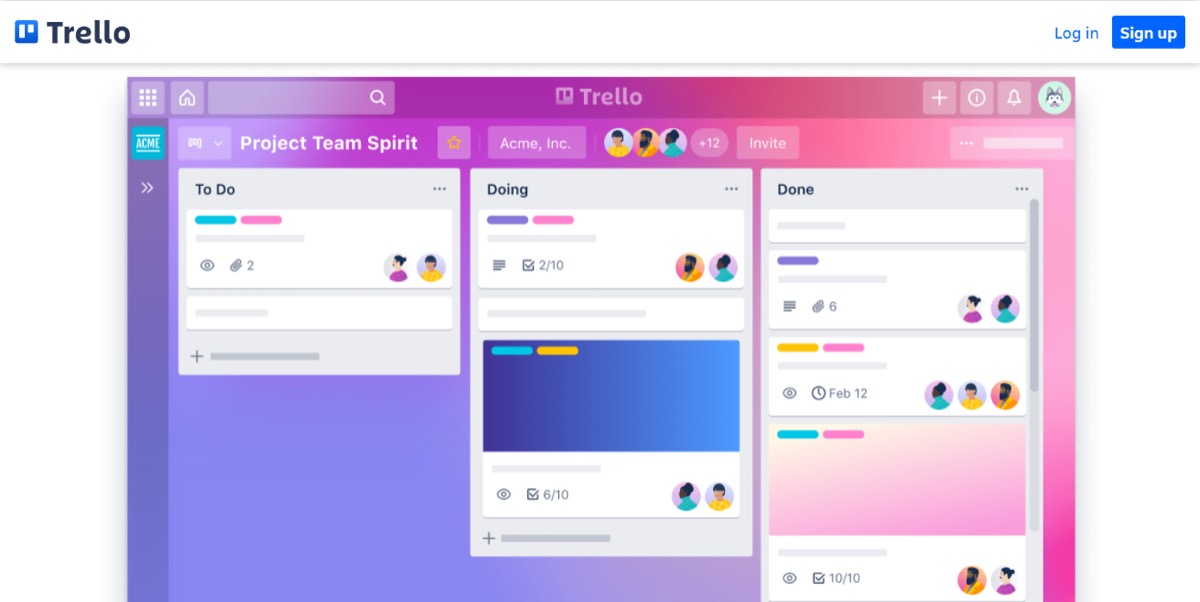
Trello is one of the most popular platforms for organizing and managing team members in various locations. One of the platform’s most powerful tools for remote collaboration is the customizable Trello board. You can use it to create simple product roadmaps, which you can share with team members and stakeholders.
Unlike similar tools, Trello has a website version and an Android and iOS app. On the downside, feedback collection is unavailable.
Features:
Create a public roadmap board to visualize upcoming, in-progress, and released features
Use cards to represent feature ideas, each with comments, attachments, and due dates
Enable community engagement by allowing voting, feedback, and card subscriptions
Automate status changes and stakeholder updates with built-in Butler automation
Mirror cards across internal and public boards to maintain alignment and transparency
Pricing:
Trello offers four pricing plans to suit teams of all sizes. The Free plan includes 10 boards per workspace and basic features. Standard ($5/user/month) adds unlimited boards, mirroring, and automation. Premium ($10/user/month) introduces AI and advanced views. Enterprise ($17.50/user/month) includes enhanced security, admin controls, and dedicated support for large organizations.
Frequently asked questions
Get answers to important questions and guidance on which tool to choose.
Which roadmap tools are free?
Canny, Trello, and Productboard all offer free plans for SaaS teams looking to start roadmapping without upfront costs. Canny’s free plan includes unlimited posts and 25 tracked users. Trello allows up to 10 boards per workspace. Productboard’s Starter plan offers one portal and 50 feedback notes—ideal for exploring roadmap tools before upgrading.
What's the best roadmapping tool for small SaaS companies?
For small SaaS companies, Frill stands out as a top roadmapping tool thanks to its balance of affordability and functionality. At $25/month, it includes a public roadmap, user feedback portal, announcements page, and a sleek, searchable interface. If your team ships frequently, upgrading to a higher-tier plan allows for expanded idea collection and user engagement.
What's the best roadmapping tool for enterprises?
ProductPlan is an excellent choice for enterprises needing strategic alignment, team coordination, and secure roadmap sharing. It offers unlimited roadmaps and viewers, OKR integration, advanced admin controls, and customizable views. With tailored pricing and scalable features, ProductPlan supports complex workflows and enterprise-grade security.
How can I improve our public roadmapping process?
To improve your public roadmap, ensure it's always up to date, clearly segmented by status (e.g. planned, in progress, released), and includes concise descriptions. Use a tool with voting and commenting to gather feedback, and notify users about updates to keep them engaged. Prioritize clean design, mobile access, and searchability to maximize usability.
Using the right roadmap tool helps your team stay aligned, your users feel heard, and your product vision clearly executed.
Want to use the roadmap tool with the best UX and pricing? Check out Frill.